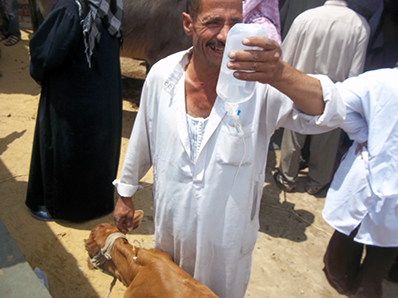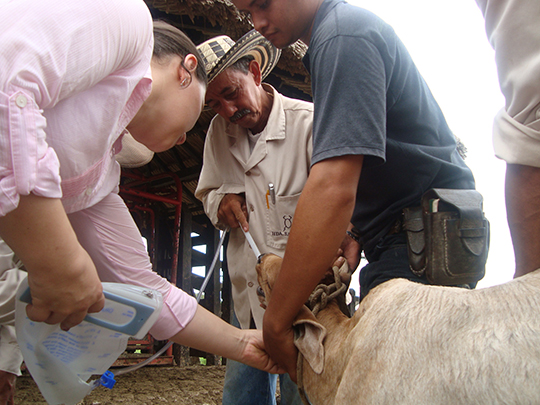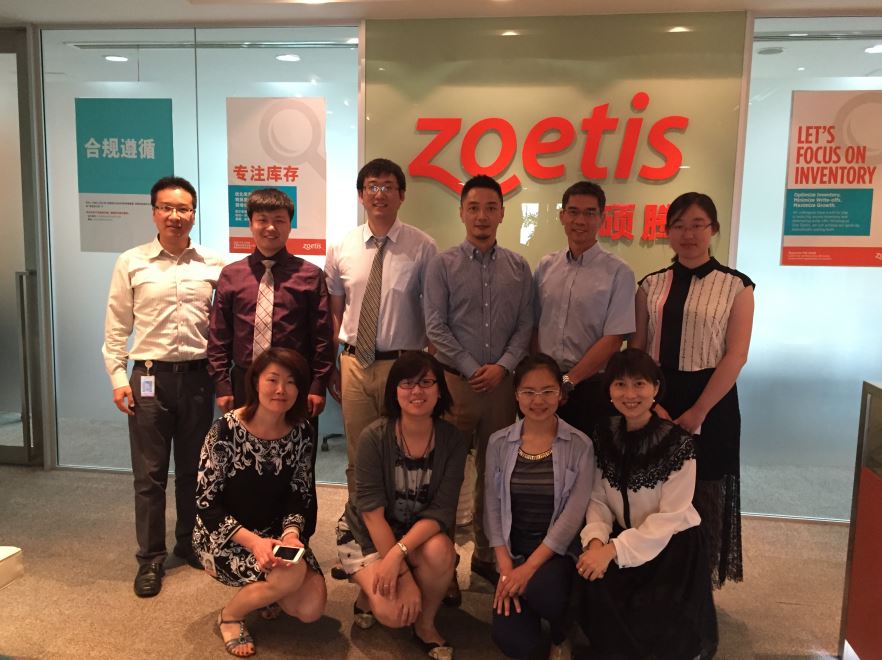Feeding the Planet, Energy for Life
September 16, 2015
Zoetis joined the conversation at the 2015 World Exposition (Expo Milano), contributing to advancing solutions to help the world’s livestock farmers produce more with less.
Zoetis joined the conversation in Milan this summer at the 2015 World Exposition (Expo Milano), contributing to advancing solutions to help the world’s livestock farmers produce more high quality milk, beef, poultry, and pork with finite natural resources. Zoetis leaders drew from experience working side by side with livestock producers worldwide to raise public awareness about agricultural sustainability and productivity and to increase the dialog between international groups from governments and business to non-governmental organizations (NGOs) and civil society.
Global call to action
Food and nutrition have become a global call to action. In 2012, UN Secretary Ban Ki-moon launched the “Zero Hunger Challenge” to eliminate hunger in the world. At the same time, the world population (currently 7.3 billion) is expected to reach over 9.7 billion by 20501. Food production will need to double to meet the demands of the rising population and increased standards of living, yet natural resources such as arable land and fresh water are limited. Innovation is the key to meeting the growing needs for food in a sustainable way, especially in developing countries where populations will grow fastest.
Producing more with less
The Food and Agriculture Organization (FAO) expects a 60 percent increase in demand for animal proteins – meat, milk and eggs2.By providing ways for farmers and livestock producers to increase productivity, the animal health industry can help address this challenge and ensure the supply of safe, high-quality food.
The World Health Organization for Animal Health (OIE) estimates that more than 20 percent of animal productivity is lost due to animal disease3.Disease and death of animals not only reduces the amount of potential protein available for consumption but also negatively affects the environment through the use of feed, water, and land and the production of carbon dioxide.
A safe, sustainable supply of animal protein begins with healthy animals. Vaccines, medicines, feed additives, improved production practices and advanced techniques and devices help veterinary professionals and producers to prevent disease, treat sick animals and optimize the efficiency of feed-to-meat conversion and milk and egg yield.
Improving animal health and productivity in developing countries
Zoetis is involved in a range of partnerships and initiatives in developing countries to help local veterinarians and farmers provide better care for their animals and increase productivity. Supporting education is an important part of advancing agricultural development and guaranteeing supply and safety of animal-derived food. Our efforts to sustain and enhance agricultural development around the world include dedicated partnerships such as:
-
Smart Village Project
Zoetis Egypt is in its fifth year of partnering with Smart Village to provide small rural farmers and veterinarians with service and education. Through the partnership, Zoetis works to enhance the capacity of veterinarians who serve small agricultural villages in Egypt that have historically had limited access to veterinary services. We support specialized training for veterinarians at Cairo University and sponsor educational newsletters for village farmers designed to expand their animal health knowledge and connect them with Smart Village veterinarians. Zoetis also sponsors a day for livestock owners to attend a seminar and have their animals examined.
Local farmer receiving veterinary services for his calf -
GANAPLAN
The Zoetis Colombia team is in its second year of running a program called GANAPLAN which helps cattle farmers track the sanitary status, costs and return on investment of their business. With a current reach of 150 farmers, this program provides each farmer with a complete analysis of their business, including testing for reproductive diseases. The information collected allows Zoetis to give targeted advice to farmers so they can make better decisions, providing them with the opportunity to grow their business.
Customers in Colombia with Zoetis Cattle Coordinator, Ana María Ocampo -
International Veterinary Collaboration for China
Zoetis is a founding member of the world’s first international animal health consortium that helps advance veterinary medical education and practice standards in the People’s Republic of China. We have also partnered with the Chinese Veterinary Medical Association and Kansas State University to promote the Doctor of Veterinary Medicine program in China and educate 50 veterinarians over the next 10 years.
The first four DVM students will graduate in 2017; they are pictured here with Zoetis colleagues, a co-sponsor for the program
1. United Nations. “World Population Prospects: 2015 Revision.”http://www.un.org/en/development/desa/population/events/other/10/index.shtml
2. Food & Agriculture Organization (FAO). “World Livestock 2011: Livestock in Food Security.” Rome, 2011.
3. The World Organization for Animal Health (OIE): http://www.oie.int/for-the-media/editorials/detail/article/feeding-the-world-better-by-controlling-animal-diseases
4. IFAC Europe